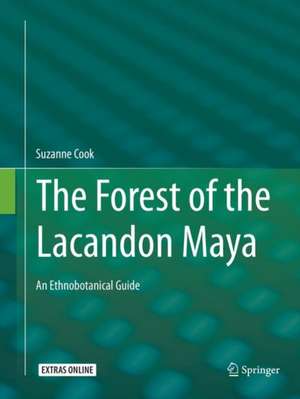The Forest of the Lacandon Maya: An Ethnobotanical Guide
Autor Suzanne Cooken Limba Engleză Paperback – 19 apr 2018
In The Forest of the Lacandon Maya: An Ethnobotanical Guide, linguist Suzanne Cook presents a bilingual Lacandon-English ethnobotanical guide to more than 450 plants in a tripartite organization: a botanical inventory in which main entries are headed by Lacandon names followed by common English and botanical names, and which includes plant descriptions and uses; an ethnographic inventory, which expands the descriptions given inthe botanical inventory, providing the socio-historical, dietary, mythological, and spiritual significance of most plants; and chapters that discuss the relevant cultural applications of the plants in more detail provide a description of the area’s geography, and give an ethnographic overview of the Lacandones. Active links throughout the text to original audio-video recordings demonstrate the use and preparation of the most significant plants.
| Toate formatele și edițiile | Preț | Express |
|---|---|---|
| Paperback (1) | 826.40 lei 38-44 zile | |
| Springer Us – 19 apr 2018 | 826.40 lei 38-44 zile | |
| Hardback (1) | 1419.29 lei 3-5 săpt. | |
| Springer Us – 16 mar 2016 | 1419.29 lei 3-5 săpt. |
Preț: 826.40 lei
Preț vechi: 1073.25 lei
-23% Nou
Puncte Express: 1240
Preț estimativ în valută:
158.15€ • 164.50$ • 130.56£
158.15€ • 164.50$ • 130.56£
Carte tipărită la comandă
Livrare economică 11-17 aprilie
Preluare comenzi: 021 569.72.76
Specificații
ISBN-13: 9781493979370
ISBN-10: 149397937X
Pagini: 379
Ilustrații: XXVII, 379 p. 599 illus., 561 illus. in color.
Dimensiuni: 210 x 279 mm
Ediția:Softcover reprint of the original 1st ed. 2016
Editura: Springer Us
Colecția Springer
Locul publicării:New York, NY, United States
ISBN-10: 149397937X
Pagini: 379
Ilustrații: XXVII, 379 p. 599 illus., 561 illus. in color.
Dimensiuni: 210 x 279 mm
Ediția:Softcover reprint of the original 1st ed. 2016
Editura: Springer Us
Colecția Springer
Locul publicării:New York, NY, United States
Cuprins
Introduction.- Language.- The Lacandon Rainforest.- The Role of Plants in Traditional Lacandon Culture.- Botanical Inventory.- Ethnographic Inventory.
Recenzii
“Suzanne Cook’s ‘The Forest of the Lacandon Maya: An Ethnobotanical Guide’ is a much-needed addition to the ethnobotanical literature. … The guide is well organized and researched, and ethnobotanists will find this book extremely valuable. The inclusion of plant names in the southern Lacandon dialect as well as other Mayan languages makes this guide especially comprehensible.” (Economic Botany, Vol. 70 (3), 2016)
Notă biografică
Suzanne Cook
University of Victoria, Department of Linguistics, Victoria, British Columbia, Canada.
University of Victoria, Department of Linguistics, Victoria, British Columbia, Canada.
Textul de pe ultima copertă
The Forest of the Lacandon Maya: An Ethnobotanical Guide, with active links to audio-video recordings, serves as a comprehensive guide to the botanical heritage of the northern Lacandones. Numbering fewer than 300 men, women, and children, this community is the most culturally conservative of the Mayan groups. Protected by their hostile environment, over many centuries they maintain autonomy from the outside forces of church and state, while they continue to draw on the forest for spiritual inspiration and sustenance.
In The Forest of the Lacandon Maya: An Ethnobotanical Guide, linguist Suzanne Cook presents a bilingual Lacandon-English ethnobotanical guide to more than 450 plants in a tripartite organization: a botanical inventory in which main entries are headed by Lacandon names followed by common English and botanical names, and which includes plant descriptions and uses; an ethnographic inventory, which expands the descriptions given in the botanical inventory, providing the socio-historical, dietary, mythological, and spiritual significance of most plants; and chapters that discuss the relevant cultural applications of the plants in more detail provide a description of the area’s geography, and give an ethnographic overview of the Lacandones. Active links throughout the text to original audio-video recordings demonstrate the use and preparation of the most significant plants.
In The Forest of the Lacandon Maya: An Ethnobotanical Guide, linguist Suzanne Cook presents a bilingual Lacandon-English ethnobotanical guide to more than 450 plants in a tripartite organization: a botanical inventory in which main entries are headed by Lacandon names followed by common English and botanical names, and which includes plant descriptions and uses; an ethnographic inventory, which expands the descriptions given in the botanical inventory, providing the socio-historical, dietary, mythological, and spiritual significance of most plants; and chapters that discuss the relevant cultural applications of the plants in more detail provide a description of the area’s geography, and give an ethnographic overview of the Lacandones. Active links throughout the text to original audio-video recordings demonstrate the use and preparation of the most significant plants.
Caracteristici
One of the most thorough ethnobotanical studies of the Lacandon Maya Numerous descriptions in the botanical inventory provided by the Lacandones in the original language Contains original audio-video recordings and corresponding transcriptions, as well as a digital version of the botanical inventory.



